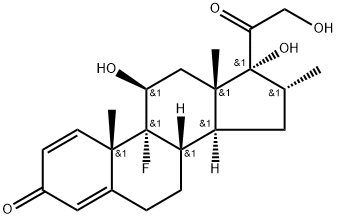Dexamethasone is an Anti-inflammatory glucocorticoid that is used to treat inflammatory and autoimmune conditions such as rheumatoid arthritis and bronchospasm. It is useful to study apoptosis, cell signaling pathways and gene expression. It is associated with marbofloxacin and clotrimazole and finds application in veterinary medicine to treat difficult ear infections in dogs. It is also used to treat horses with swelling of of distal limbs and general bruising in combination with trichlormethiazide.
Dexamethasone induces the production of phospholipase A2 inhibitory protein (lipocortin). It also inhibits induction of nitric oxide synthase (IC50=5 nM). Dexamethasone has been shown to cause reduction in cyclin A and Cd k2 activity, inhibition of G1/S transition in osteoblasts and inhibition of phosphorylation of Rb protein in vitro. Dexamethasone has been observed to induce apoptosis in human thymocytes and eosinophils, but inhibits apoptosis in neutrophils in vitro. Dexamethasone is an activator of IDO.
Dexamethasone Inhibits the expression of the inducible but not the constitutive nitric oxide synthase in vascular endothelial cells (IC50=5 nM). Dexamethasone regulates T cell survival, growth, and differentiation.Enhances active cation transport in aortic smooth muscle cells by stimulating the Na+-K+ pump. Has anti-inflammatory and anti-rheumatic properties. Induces apoptosis in human thymocytes. In general, 500-1000 nM of dexamethasone is sufficient to induce apoptosis following a 6-hour incubation at 37°C.

